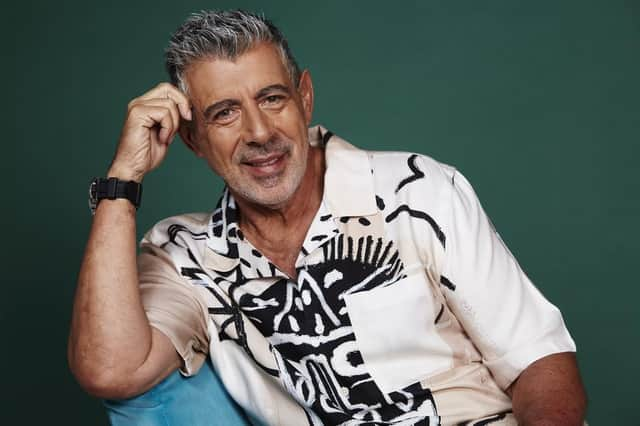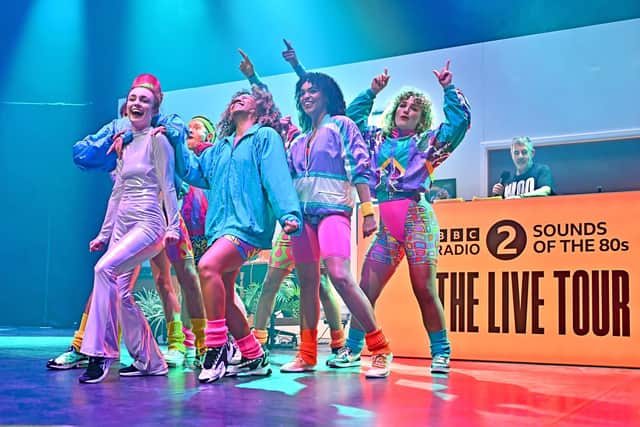Gary Davies: 'There’s never been a decade like the 80s'


Today, as presenter of Radio 2’s Sounds of the 80s programme, he’s a proud advocate of what he considers to be pop music’s finest decade.
“There’s never been a decade like it,” the 66-year-old tells The Yorkshire Post. “In terms of variety and depth of music, there’s never been so many forms of music that were created in the 80s that are still so relevant today.
Advertisement
Hide AdAdvertisement
Hide Ad“For example, the birth of electronic music, the New Romantics; towards the end of the 80s we had the birth of house music which we know is still relevant today probably more than ever. You still had your rock bands; hip-hop and rap started in the 80s; so many iconic artists that are still relevant today were born in the 80s – whether it was Madonna or Whitney, I know Michael Jackson started a little bit before but he was massive in the 80s; supergroups – U2, Bon Jovi, Simple Minds, Tears For Fears, Def Leppard, Aerosmith – loads of them.
“And then, of course, you had your amazing pop music, Stock Aitken Waterman for the latter part of the 80s, Rick Astley and Sonia, Dead Or Alive and everything else. So in terms of different genres and variety and music that stands the test of time today, I think that’s what really sets the 80s apart.”
This month, the Manchester-born DJ will be taking Sounds of the 80s on the road with a show that recreates the show live on stage. “Just over a year ago, we did the Sounds of the 80s live from Stoke and it just worked so well that we all just thought, my word, this would be great taking this out into concert halls and theatres, and so that’s what we did last year and it was just incredible, the atmosphere and the fun,” he says. “We were doing the show in theatres where everybody had a seat but nobody sat down. It was just a full-on 80s rave for over three hours.
“We actually recreate the show that you hear on a Saturday night live onstage. It’s not going out live on the radio, but when you go there you feel like you’re part of the radio show. We bring it to life with Gary’s Gang, who are amazing, dancers who are doing routines to classic 80s songs like Dirty Dancing and Michael Jackson’s Thriller and Ghostbusters.”
Advertisement
Hide AdAdvertisement
Hide AdEighties pop start Toyah will be joining them as special guest in York. “We did a show with her in Birmingham on New Year’s Eve,” Davies says. “Apart from interviewing her on Zoom a couple of years ago when I sitting on for the (Radio 2) Breakfast Show, I hadn’t seen her for years, and she is just as brilliant as ever, she absolutely tore the place apart. She was so good that we all thought we need to get her back for some of the shows this year.”


Growing up, Davies says he loved music. “A lot of that was down to my cousins, Ivor and Jack, who owned a legendary club in Manchester called the Twisted Wheel. They would sneak me backstage when I was 13 or 14 years old to watch people like Rod Stewart, Wilson Pickett, Junior Walker and the All Stars, and I was just blown away,” he says.
“They were also like really cool cousins because whenever I had a birthday when everyone else was buying me underwear and handkerchieves, they would buy me the top 10 singles. Then I was away at boarding school for a while and everyone was really into music there.
“Twisted Wheel then became a club called Placemate and I started working on the door collecting money for my cousins because they knew if I was on the door no-one was going to be nicking anything off them, I was someone they could trust. So that’s what I did from the age of 17. Then probably after six or seven moths, one of the DJs didn’t turn up, he was ill, and they said ‘who are we going to get to DJ?’ I said, I’ll do it and I started DJ-ing at the club from then on.
Advertisement
Hide AdAdvertisement
Hide Ad“That’s where it all started, I just loved playing music, it was the best buzz, and then it was I guess out of everything that I’m doing DJ-ing was the thing that I loved more, so it was then let’s see if I can break into radio, which wasn’t that easy, it took me a good two years before I got a break. I got rejected by everybody, including Radio 1. They used to send me the nicest handwritten notes; everybody else’s was this photocopied thing saying ‘sorry, not hiring at the moment’.”
That first break was at Piccadilly Radio in Manchester, but in 1982 he finally got his prized job at Radio 1. He says: “I don’t think I slept for the first two years, the excitment and the buzz. This was my dream job, this is what I wanted to do. There was nothing bigger for a DJ than working for Radio 1 back then. I was just in awe. I thought I’ve got all these legends all around me, people I used to listen to growing up as a kid and here I am working alongside them. It was the most incredible 11 years of my life, I absolutely adored it.
“It’s funny Piccadilly could be a little bit bitchy and backbite-y and stuff like that, and I had this feeling that Radio 1 could be like that and more, and it actually was completely the opposite. It was such a warm, friendly family, everybody was lovely and they really welcomed me.”
“So many” memories stand out from that period, he says, but hosting Top of The Pops was special. “My God, I used to watch that show as a kid thinking if only I could be in the audience and here I am ending up hosting it, so that has to stand out,” he says. Then there was the Radio 1 Roadshows, which became a feature of summer. “It’s hard to remember how massive they were, how the British public would book their holidays based on where the Radio 1 Roadshow would be. Anything up to 50-60,000 people on the beach at 11 o’clock in the morning going crazy.”
Advertisement
Hide AdAdvertisement
Hide AdOne of the biggest Roadshows he did was his last, in Markeaton Park in Derby. He recalls: “I think we had about 80,000 people and it could have been more had we not jammed up all the motorways so people couldn’t get there. It was just phenomenal, and it was the 21st anniversary of the Roadshow and my guest on the show was Fluff Freeman who of course did the very first Roadshow in Newquay 21 years prior to that, so that was pretty magical. It was a good Roadshow to go out on.”
It’s now six years since Davies rejoined the BBC, after a 25-year spell away, during which he worked for commercial stations before setting up a music publishing company with his brother, Mark. “I’ve always felt I had a pretty good ear for spotting a hit, so when I left Radio 1 I thought let’s see if I can do it now from the other side – spot hit artists, spot hit songs, and see if I can have some success. It was a lot more difficult than I thought, and when you’re putting your own money into it it’s an expensive business as well,” he admits. Nevertheless he did eventually hit paydirt with All Saints’ Black Coffee. “I was on the verge of going bankrupt and then that hit and that basically enabled me to sign more writers. We ended up having songs with Kylie and Celine Dion and Girls Aloud and other artists like that.”
Along the way he also discovered the Leeds singer-songwriter Corinne Bailey-Rae, who went on to sell four million copies of her debut album. “She’s a proper, proper artist and so talented, and such a lovely girl as well,” Davies says admiringly.
Having witnessed many changes in broadcasting since he started at the turn of the 80s, he remains convinced of radio’s worth. He believes it is “that companionship” with listeners that makes it a special medium. “It’s that one-to-one communication, it’s your friend who’s always there, there’s no other media like it,” he explains. “Yeah, you’ve got social media but it’s not personal, it’s you putting something out then whoever can look at it and can take part, but with radio it’s unique. It’s not like TV; with radio, it’s your one-to-one relationship with the listener.”
Advertisement
Hide AdAdvertisement
Hide AdBy way of exapmple, he says he was “very humbled” a few weeks ago when he received a letter from a listener. “She said, ‘You don’t know me, but I just want to say how much you’ve helped me over the last few months. I lost my husband, everything was terrible, I decided to just get out of the UK and take my car and my dog and drive to Spain and you were my company’ – because I sit in in the morning for Vernon (Kay) when he’s not there – and she said, ‘You were my comfort and my companion every day whilst I was driving through to Spain and when I was there and I just want to let you know what an amazing job you do and how you really help people get through terrible times’.
“It was so humbling to receive something like this because I do the show, I’m chatting away, but you don’t actually realise what the effect can be on some people, and when you get a letter like that it really makes it all worthwhile.”
Sounds of the 80s: The Live Tour 2024 visits York Barbican on February 23 and Scarborough Spa on May 10. https://www.soundsofthe80slive.co.uk/
